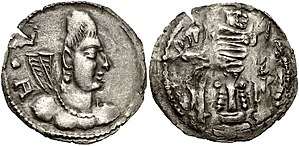Khingila I
| Khingila I | |
|---|---|
| Tegin of the Alchon Huns | |
|
Portrait of king Khingila c. 440 - 490 CE. | |
| Reign | 430-461 |
| Successor | Mehama |
| Born | 430 |
| Died | 480 |



Khingila I (Persian: شنگل Shengil, Bactrian: χιγγιλο Khingil, Middle Chinese: 金吉剌 Jinjila) c.430-490, was the founding king of the Hunnic Alkhan dynasty (Bactrian: αλχανο, Middle Chinese: 嚈噠), a contemporary of Khushnavaz (fl. 484) in Khwarezm.
In response to the migration of the Wusun (who were hard-pressed by the Rouran) from Zhetysu to the Pamir region (Chinese: 葱嶺), Khingila united the Uar (Chinese: 滑) and the Xionites (Chinese: 狁) in 460AD, establishing the Hepthalite dynasty.
According to the Syrian compilation of Church Historian Zacharias Rhetor (c. 465, Gaza – after 536), bishop of Mytilene, the need for new grazing land to replace that lost to the Wusun led Khingila's "Uar-Chionites" to displace the Sabirs to the west, who in turn displaced the Saragur, Ugor and Onogur, who then asked for an alliance and land from Byzantium.
See also
References
External links
| Preceded by Anonymous |
Tegin of the Alchon Huns 430-461 |
Succeeded by Mehama |